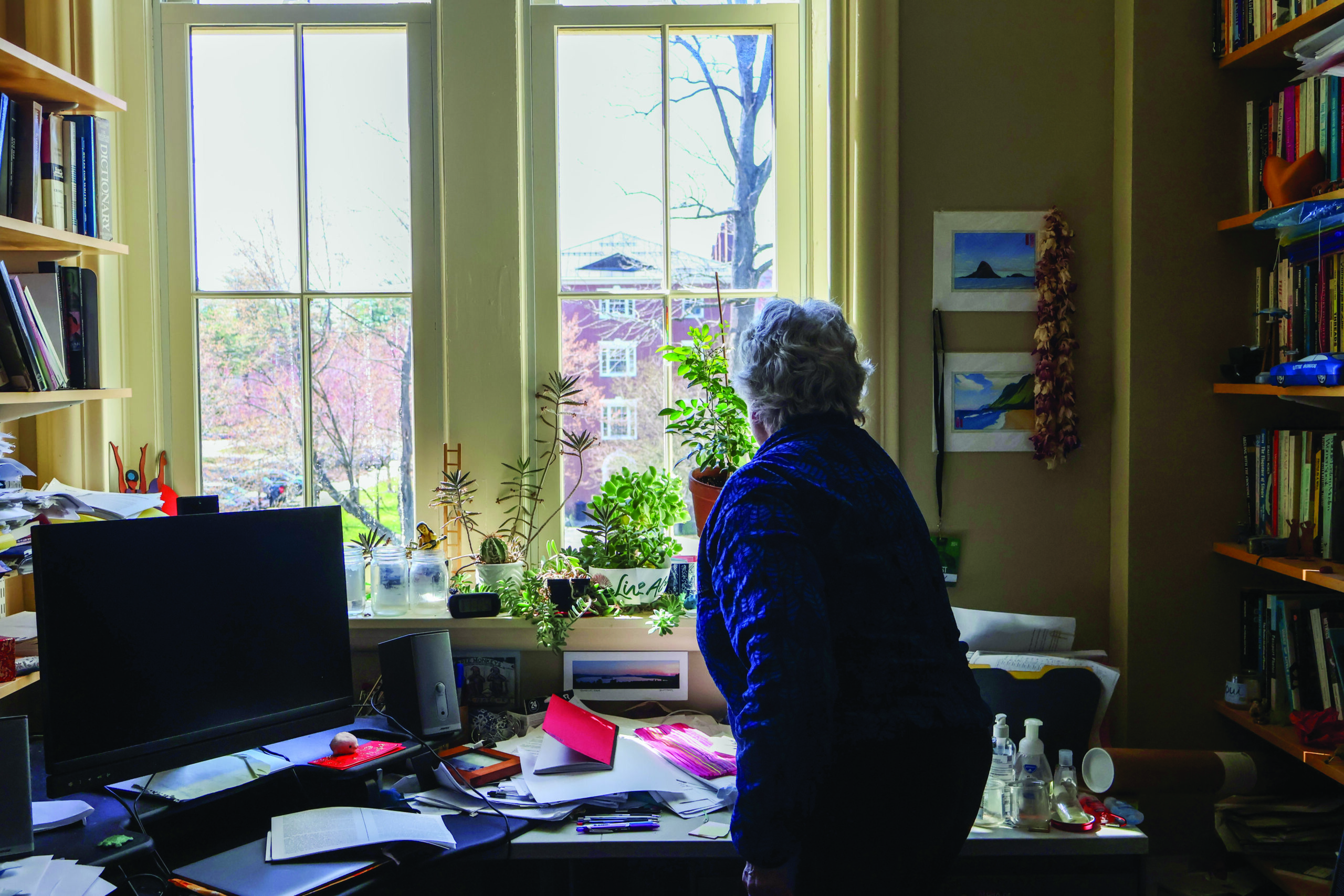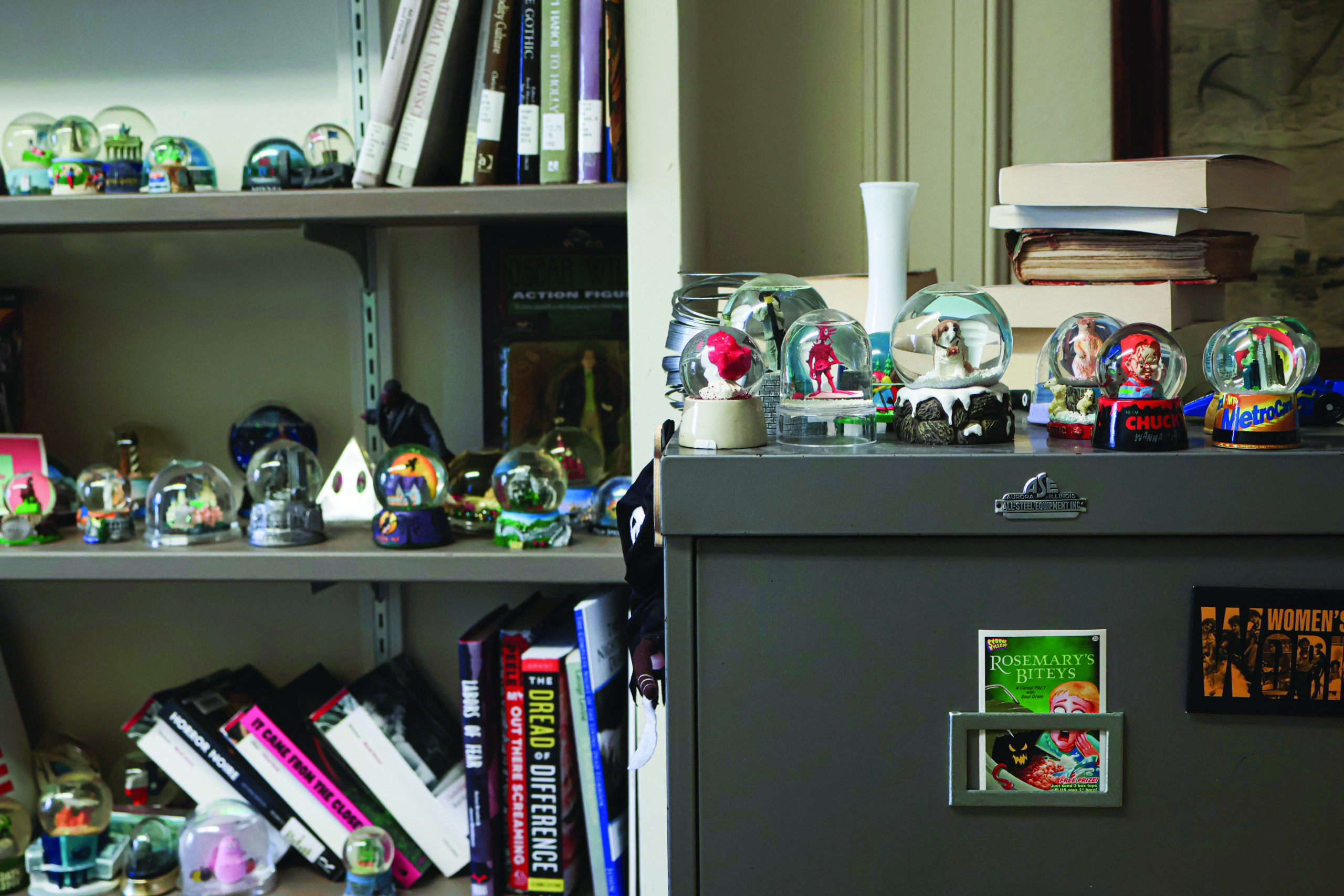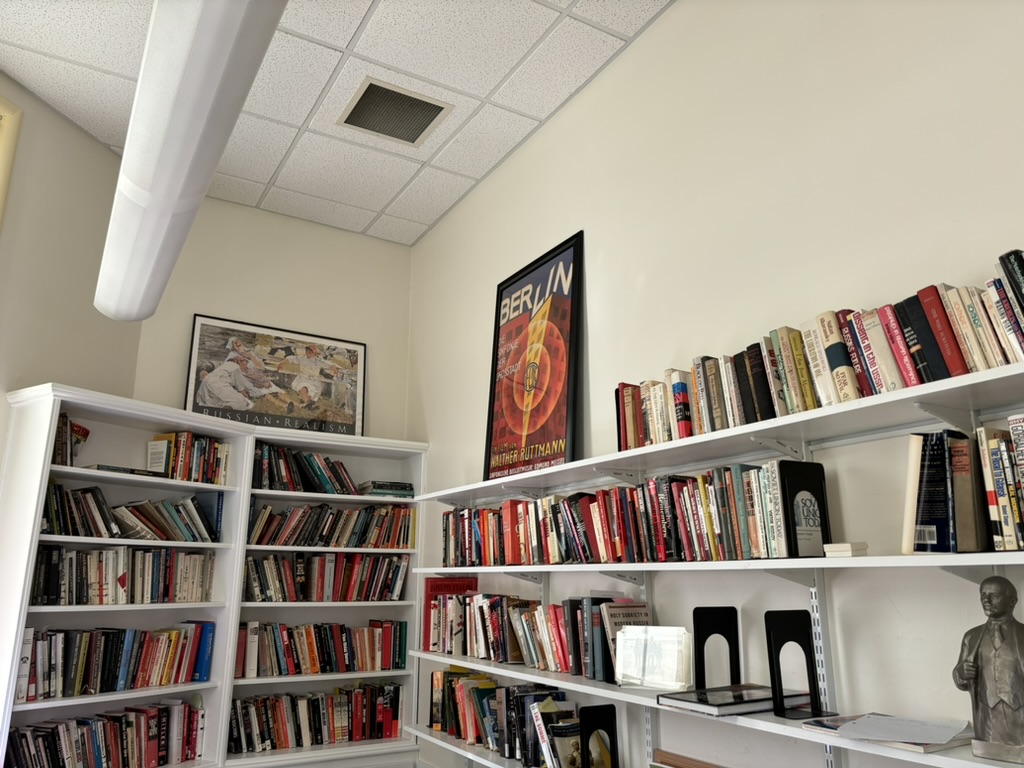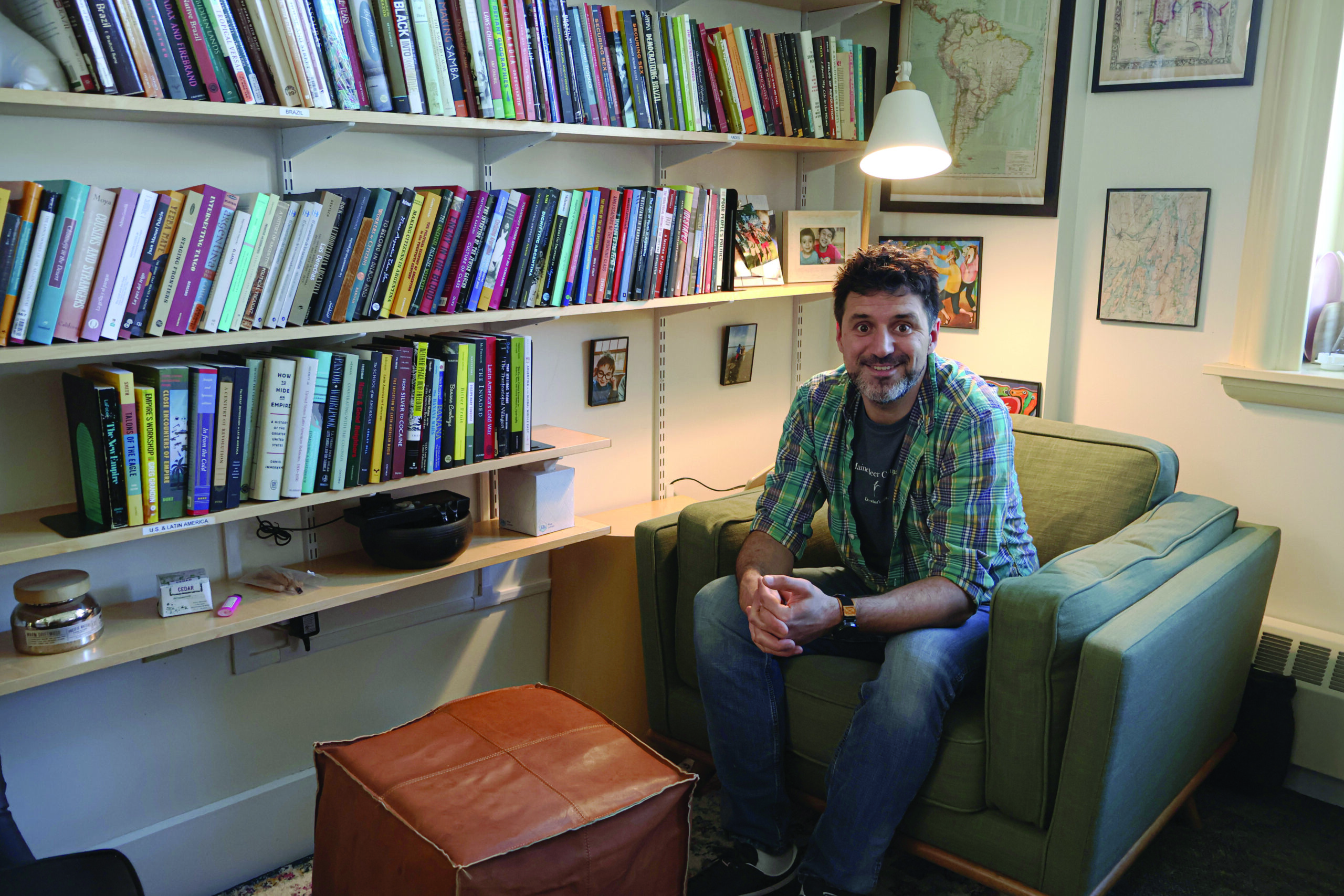Beyond the books: stories from professor offices
April 19, 2024
 Amira Oguntoyinbo
Amira OguntoyinboStudents often venture into professors’ offices to discuss topics for a potential paper or to ask a question about the next problem set, but rarely learn about the meaning behind the decorations and trinkets that they display in their space. Accordingly, the Bowdoin Orient decided to go on some tours this week to uncover the hidden joys within the offices of six professors.
Professor of English Language and Literature and Cinema Studies Aviva Briefel decorates her office shelves with snow globes. She started building a snow globe collection while visiting airports searching for jobs in graduate school.
“I would go to a lot of airports and I was kind of bored, and so I bought a snow globe. I think the first one was San Francisco. So every time I go to the airport or a different place, I get one, but also sometimes students will bring the snow globes, or family members [will bring them],” Briefel said.
Her snow globes vary in theme—she has one resembling Pompeii with ashes, a Freddy Krueger snowglobe and a Salvador Dalí snowglobe. Beside her shelves and tabletops, she also has posters of “Get Out” and “The Munsters,” reflecting her love for all things horror film.
“I just feel very happy in the space, but I really feel that it’s very representative of me. I mean, it’s almost like another home,” Briefel said. “And just looking at the shelves I can see things that I got over the years, either students gave me or brought in. I can see a history of my time here by looking at the different things.”
 Amira Oguntoyinbo
Amira OguntoyinboTo get to his office, Professor of Constitutional and International Law and Government Allen Springer enters Hubbard Hall, walks up to the second floor and climbs up another, smaller staircase tucked on the left side of the building to enter his office. Springer has memories of hosting a party in his office when he first moved to Maine in the mid 90s, as well as having his kids play at two makeshift desks in his office.
“When my kids were younger, my son and daughter would each have their own sort of work area, and they would have a lot of stuff and crayons and all sorts of things like that,” Springer said. “I have to say that one of the things that does unnerve me is the thought of how I’m going to get stuff down that I want to keep.”
Springer also has memories of grading exams on the night of Halloween in his office.
“I will tell you being up here in this room on Halloween is a little creepy. There is that book about a haunted Bowdoin and, supposedly, rumors of ghosts that have circulated, presumably, on this floor. But, I can’t say that I’ve ever seen them,” Springer said.
Professor of History Page Herrlinger’s office features a collection of posters and artifacts from the Soviet Union and some from before the Russian Revolution. From 19th century vodka and beer bottles to Soviet orange juice and ice cream advertisements to women’s rights posters, Herrlinger’s decor reflects her academic passions in Russian and women’s history.
“These are just very classic early Soviet posters, which I always teach in my class,” Herrlinger said. “This one is about the importance of literacy, and the other is about freeing women from kitchen slavery: the drudgery of housework. And then this one is about women as being more than half the world, and it’s from the Danish Workers Museum, which I really love.”
In addition to decorations that she collected during her travels to Russia, Herrlinger displays items that remind her of past students and colleagues.
“These are things that have been collected not just by me but by other Russian students over the years,” Herrlinger said. “The little baby samovar was a gift from a colleague.”
Rows of hanging shelves line Herrlinger’s office, but her collection expands far beyond the books showcased on her walls.
“I gave away a lot of books when I moved over from Hubbard, but I have more books in the closet in the seminar room and more books in the [Department Coordinator’s] office because there’s just so many of them,” Herrlinger said. “As you’ll notice, a lot of them are red. Everyone always asks, ‘Why do you have so many red books?’ And it’s because I teach communism.”
 Kaya Patel
Kaya PatelProfessor of Social Sciences Nancy Riley chuckled at the thought of her cluttered office being worthy of showcase. Yet, with walls filled to the brim with books and trinkets and a window sill lined with plants, each corner tells a story of her professional and personal journey.
“People know I collect things—like really crazy little things—so, sometimes students give me things that are really fun,” Riley said.
These trinkets include many playful figures that rest on her shelves and welcome students into her space.
“I think when students come, it’s sometimes intimidating to walk into a professor’s office, and I say, ‘Have you seen my latest wind up toy?’ And then they think, ‘Okay, she’s just crazy or something,’” Riley said.
Riley used to live in Hawaii, where she grew fond of jasmine plants, called “pikake” where she lived.
“I have wonderful light here. This window is just fabulous, so this [plant] flowers all the time, and it just finished flowering,” Riley said.
Riley also exhibits a Chinese tea collection that reminds her of the time she spent living in China. However, the most astounding collection she features is her book collection. When she moved from the Matilda White Riley House to Adams Hall, the designer informed her that the original design for her office would not fit nearly enough of her books.
“[She said], ‘You have way too many books to fit in that office.’ And I didn’t know what to do, so she convinced the builders to poke out this alcove so that I could have a place for my books,” Riley said.
Professor of Government Janet Martin echoed the sentiment that there is never enough space for a professor’s book collection. Despite having her large office lined with bookshelves, Martin explained that she had to get rid of approximately 300 books upon her move to Hubbard’s basement.
“A lot of people have the decorator-type of an office where they have plants and photographs and objects,” Martin said. “[Government professors] have books.”
However, similar to others, Martin has found ways to add humor and joy to her office alongside her book collection. One of these items is a life-size cardboard cutout of Newt Gingrich gifted to her by Professor of Anthropology Susan Kaplan.
“He scares people to death…. I’ve had Newt Gingrich for 20 years now, and I don’t quite know what to do with him,” Martin said.
The department now uses him as a sign to guide people for events occasionally. Martin even considered using him as a scarecrow by her window once, but realized he might dissuade campus visitors.
Along with her humorous political figures, Martin described her photo with Laura and George W. Bush in the White House Blue Room that sits atop her Congress book collection as a prized possession.
“[The White House Historical Association] was having a special celebration of the 100th anniversary of the creation of the West Wing,” Martin said. “Somebody lent me a jacket because I didn’t know we were actually going to meet the president on that day.”
 Kaya Patel
Kaya PatelWhile Assistant Professor of History Javier Cikota also has memorabilia in his office, students often first notice a tabletop water fountain on his shelf. He initially bought the fountain for his house because he loved the idea of having running water in his backyard. But, he soon moved it to his office after his young kids kept tampering with it.
“We have two young kids, three and seven, and all they do when they see the thing is put their fingers in it and turn it on and off. So then I had to put it in the office, and now they want to come to the office all the time to play with it,” Cikota said. “You can mess with the stones to make them louder, if you make the water gurgle, more or less, so it helps to just kind of have something else to distract me from the voices and the sounds.”
Bowdoin gave Cikota office startup funds, which he used to decorate his office with two upholstered chairs, a vibrant rug, vintage maps and plants. After previously working in sterile offices, he decided to make his office a place for him and his students to feel comfortable.
“Having a sterile space just does strange things to your brain, like decreasing your productivity—not that we need to be productive all the time,” Cikota said. “But if you’re putting in like four hours, having a place that’s cozy and that calls you and stimulates [you] is important to do good work.”
In addition to these decorations, he has a collection of thank you notes from students pinned to his wall that he calls his “brag wall” and photos of his family dispersed throughout his office.
“It’s a good reminder that even when we’re here in the office, the people you love are around you. And when you’re having a week like I’m having this week, when I’m feeling like everything is wrong … I look up and I remember that I got this, and I know how to do this job,” Cikota said.
 Amira Oguntoyinbo
Amira Oguntoyinbo
Comments
Before submitting a comment, please review our comment policy. Some key points from the policy: